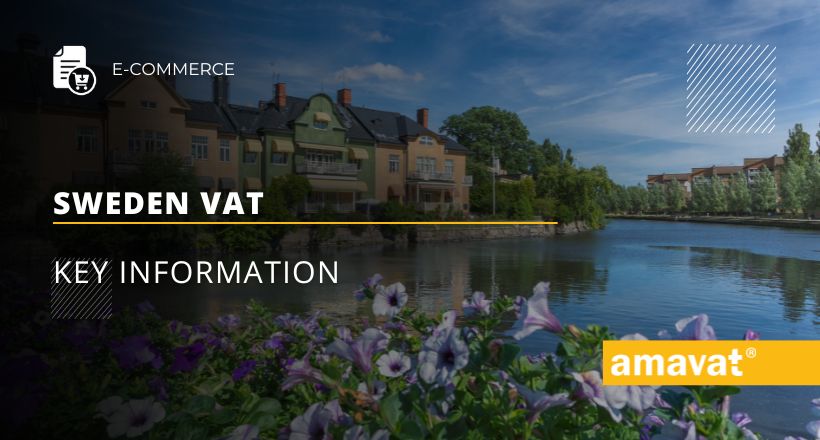Sweden VAT: Key information
Value Added Tax, commonly known as VAT, plays a crucial role in Sweden’s tax system. Introduced in 1960 as Mervärdesskatt (Moms), VAT is a significant source of state revenue and impacts nearly every aspect of the economy. In this article, we will detail how VAT operates in Sweden, its rates, registration procedures, and reporting obligations.
VAT rates in Sweden
Sweden has four main VAT rates, each applied depending on the type of goods and services:
Standard Rate – 25%
This rate applies to most goods and services not covered by the reduced rates. Examples include electronics, clothing, telecommunications services, and most consumer products.
Reduced Rate – 12%
This rate is applicable to specific categories of goods and services, including:
- Certain food items
- Non-alcoholic beverages
- Takeaway food
- Hotel accommodation
- Restaurant and catering services
- Repairs of bicycles, shoes, and clothing
- Some artworks
Reduced Rate – 6%
This rate covers goods and services related to culture and sports, such as:
- Domestic passenger transport
- Books
- Newspapers and periodicals
- Tickets to cultural (excluding cinema) and sporting events
- Use of sports facilities
Zero Rate – 0%
This applies to specific categories, including:
- Prescription medications
- Printing services and related services for non-profit organization publications
- International and intra-community passenger transport
VAT registration in Sweden
Any business operating in Sweden or intending to conduct VAT-liable activities must register in the Swedish VAT system. This process involves several key steps:
- VAT number: Upon registration, the company receives a unique VAT number in the format SE + 12 digits (e.g., SE123456789123).
- Registration forms: Businesses without a permanent establishment in Sweden must complete form SKV4632. This application, along with attachments like the company’s articles of association or power of attorney for the tax representative, should be submitted to the Swedish Tax Agency (Skatteverket) in Malmö or Stockholm.
- Registration obligations: VAT registration is mandatory for companies importing goods, selling goods remotely to other EU countries (if sales exceed EUR 10,000), or providing services within Sweden.
Swedish VAT invoices
Businesses must issue invoices that comply with VAT requirements. Basic elements required on a Swedish VAT invoice include:
- Date of issuance
- Unique invoice number
- Full address details of both supplier and customer
- Supplier’s VAT number
- Description of supplied goods or services
- Quantity of goods or scope of services
- Date of supply, if different from the invoice date
- Net value of the supply
- Applicable VAT rate and VAT amount
- Total gross value of the invoice
VAT reporting in Sweden
The frequency of VAT returns depends on the company’s annual turnover:
- Monthly returns: Required for companies with an annual turnover exceeding 40 million SEK. The submission deadline is the 26th of the month following the reporting period (or the 27th of December).
- Quarterly returns: For companies with a turnover between 1 million SEK and 40 million SEK. These are due by the 12th day of the second month after the end of the quarter.
- Annual returns: For companies with a turnover below 1 million SEK. The filing deadline is the 26th day of the second month after the end of the accounting period.
Additionally, businesses must submit summary reports on intra-community supplies of goods and services. The value and type of supplies determine the reporting frequency (monthly or quarterly).
Penalties and sanctions – VAT SE
Failure to comply with VAT obligations can result in penalties and interest. Late payments may incur interest at 15% of the tax due, and incorrect declarations may be penalized with a fine amounting to 20% of the incorrectly reported VAT.
Intrastat in Sweden
The Intrastat system in Sweden monitors the flow of goods between EU countries. Businesses operating in Sweden must submit monthly Intrastat reports by the 10th working day of the month following the reporting period. Detailed deadlines are regularly updated and available on the Statistics Sweden website.
Businesses are required to submit Intrastat reports when they exceed established thresholds within 12 months. Based on data from monthly or quarterly VAT returns, Statistics Sweden informs companies of their reporting obligations. This requirement remains until the company is notified of its termination by the relevant authorities and is applicable even if the annual transaction value falls below the set thresholds.
Currently, the thresholds in Sweden are 4.5 million SEK for dispatches and 15 million SEK for arrivals. Exceeding these values obliges businesses to submit monthly reports, which are crucial for tracking and analyzing trade flows within the European Union.
For Intrastat rates in other European countries, please visit our page: Current Intrastat thresholds and VAT rates in Europe.
Summary
Swedish VAT is a comprehensive system encompassing various rates and detailed requirements for registration, invoicing, and reporting. Understanding these regulations is crucial for any business operating in the Swedish market. VAT rates vary depending on the type of goods and services, and administrative obligations may require regular filings and meticulous documentation. Companies planning to do business in Sweden should familiarize themselves with the applicable rules or seek professional assistance to avoid potential tax issues.
Entrepreneurs can find support from the Swedish Tax Agency (Skatteverket), which offers tools and resources to help understand and meet VAT requirements. Effective management of VAT obligations can not only help avoid penalties but also ensure smooth business operations in the dynamic Swedish market.
For further inquiries or additional information, we encourage you to contact our team of experts, ready to provide assistance and support: Contact us – amavat®.





